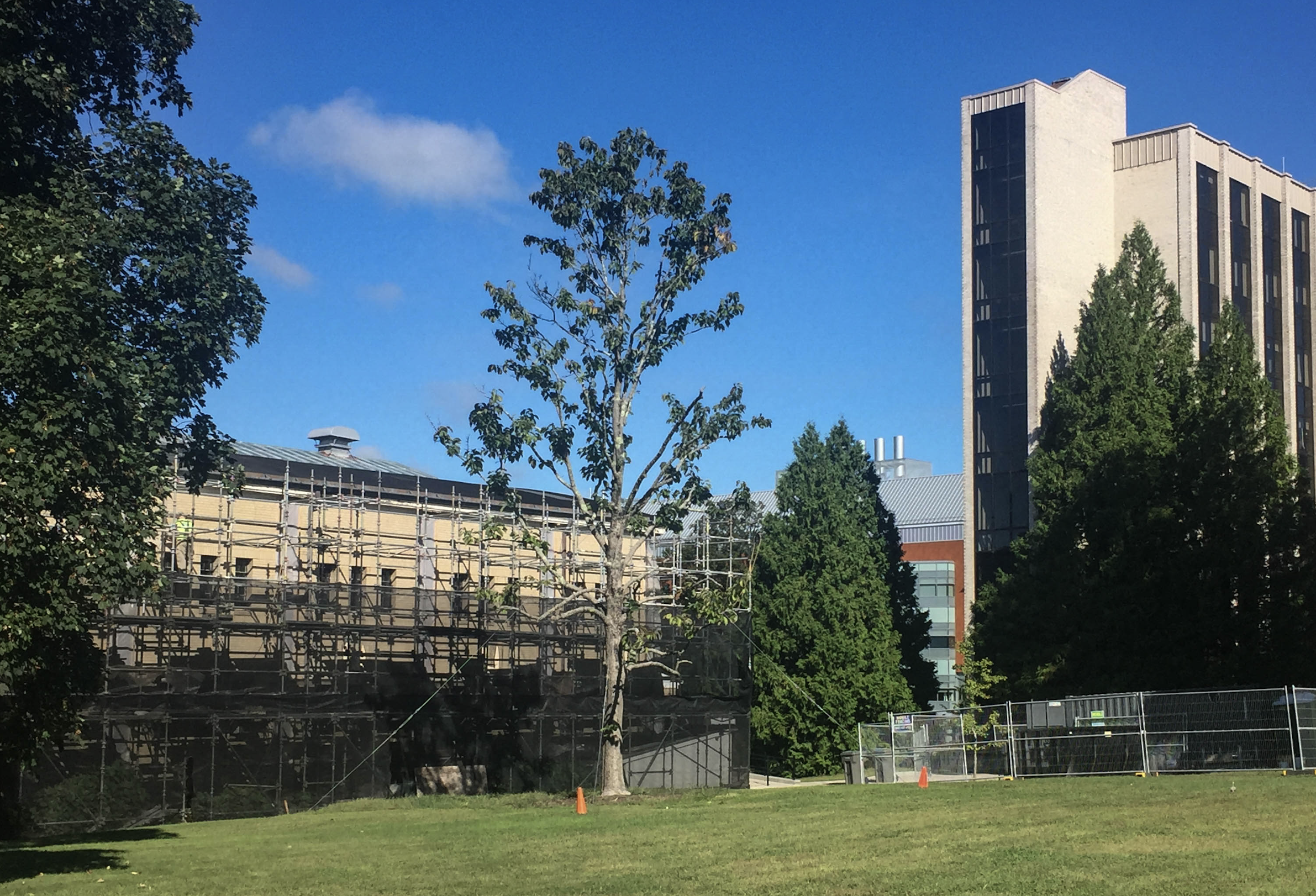Photo by Harry Schlenger | Construction began on Rodman Hall at the beginning of the semester in order to preserve the historic character of the building.
The University of Rhode Island began construction on the exterior of Rodman Hall this fall much to the surprise of many in the community.
The University decided it needed to renovate Rodman’s exterior during an annual review. The construction will be part of the University’s Asset Protection Plan, which works to preserve the historical integrity of buildings on campus while keeping them safe and clean.
“Rodman is a historic building on campus,” Bob Schultz, manager of Construction Projects said. “The design is intended to preserve the historic character of the building.”
Rodman’s masonry was deteriorating due to water infiltration. The team plans to shed water to prevent internal draining and to cap east side columns with concrete to prevent the problem. The windows are also being replaced.
Construction began in August, which is later than projects typically begin. Paul DePace, director of Capital Projects, said University processes were partially why construction began so late and lasted into the school year.
“We have a very strict procurement process,” DePace said. “That requires that a certain bidding protocol and award protocol before the contractor actually gets in our hands so we can mobilize to do our work. The decision was made that this was a priority late in the spring, so the procurement process took us through the purchase order in August.”
According to DePace, it will take over a year to do the work because of the funding available. The east side, which is currently being renovated, should be finished by the end of the calendar year. All wings will be completed by the end of next summer. The project will cost $856,000 in total.
There were concerns that the construction would disrupt classes in the building, but DePace said that Capital Projects made sure construction wasn’t disruptive.
“There was a significant effort after the purchase order was issued to do all of the demolition part, which is the column and the exterior before classes start, and that was accomplished,” said DePace.
Schultz also stated that the construction team kept in touch with the community before and during construction.
“We have a bi-weekly meeting right in Rodman with several of the principal faculty and staff attend,” Schultz said.
However, DePace admitted that not all students were warned about the construction.
“It would be difficult to advise all students on when construction would start,” DePace said. “If there were certain classes that had to be moved, we would take that into account, but this is all in the exterior of the building. When we take the windows out it will be over a weekend. We understand that it wouldn’t be surprising that students were surprised.”
Bill Corey, an adjunct journalism professor, was made aware of the construction through Journalism Department Chair John Pantalone.
“[The construction] honestly hasn’t been much of a problem, but it’s a small sample,” Corey said. “We’ve only had three classes and there was really only one day where it was a little bit distracting.”
Corey said that if construction grew too distracting, he could simply relocate his class to avoid it, but he hasn’t felt the need to do so yet. Despite the occasional disruption, Corey is optimistic about what the construction means for the University.
“It’s encouraging that they’re taking some steps to improve Rodman,” said Corey.
Students were more critical about the distraction caused by the construction.
“It’s random noises at random times. It’s hard to hear class sometimes” freshman Nikky Lasky said about the construction.
Allie DeSilva, a sophomore, said that she wished that Capital Projects would have given an earlier notice about construction.
“Our professor speaks Spanish and kind of softly so even though we are on the other side of the building, the construction is overpowering,” DeSilva said.
DePace responded to this criticism by saying that although the construction is frustrating, it had to be done.
“You can use the analogy ‘you have to break some eggs to make an omelet,’” DePace said. “There’s gonna be some noise. This project could not fit in with the summer. We wanted to make sure classes fit with the construction, but it had to be done.”





